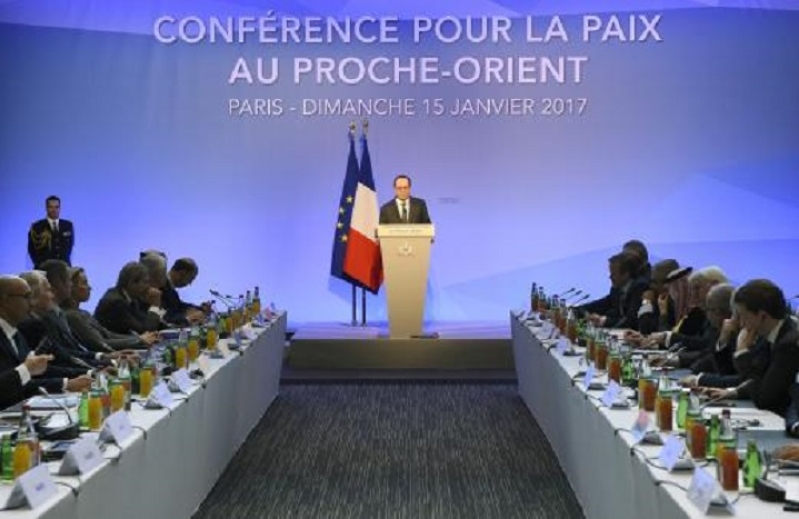
At the end of the so-called peace conference held in Paris on Sunday, nations pushed for a two-state solution to address the conflict between Israel and Palestine.
French Foreign Minister Jean-Marc Ayrault addressed envoys from about 70 nations at the one-day conference and said a two-state solution is "the only" solution needed to end the decades-long Israeli-Palestinian conflict. NPR reported.
French President Francois Hollande said there will be no stability in the Middle East until the conflict between Israel and Palestine is not addressed.
Representatives from both Israel and Palestine were not present in the Paris peace conference.
U.S. Secretary of State John Kerry expressed his support for the establishment of a Palestinian state and said his presence at the conference was meant to "ensure America's continued interest in a two-state solution is preserved."
After the summit, Kerry called Israeli Prime Minister Benjamin Netanyahu to inform him that the U.S. will prevent any follow-up action to the peace conference. Kerry's call was meant to "soften" the final communique from the conference, Times of Israel reported.
Netanyahu reminded Kerry that the U.S.' refusal to veto the U.N. Security Council Resolution 2334, which states that Israel's activity in "Palestine territories occupied since 1967" has no legal validity and is a violation of international law, in December is damaging to Israel.
In previous administrations, the U.S. has vetoed similar resolutions proposed regarding the said territory.
The joint statement released at the end of the Paris conference calls upon Israel and Palestine to "officially restate their commitment to the two-state solution, thus disassociating themselves from voices that reject this solution," according to another report from the Times of Israel.
It also urges both sides to "independently demonstrate, through policies and actions, a genuine commitment to the two-state solutions and refrain from unilateral steps that prejudge the outcome of negotiations on final status issues, including, inter alia, on Jerusalem, borders, security, refugees and which they will not recognize."
The U.K., in a move that deviated from the 70 nations that attended the Mideast peace conference, refused to sign the joint statement, saying it had "particular reservations" about the so-called peace conference where no Israeli or Palestinian representative was present.
The fact that the conference took place "just days before the transition to a new American president when the US will be the ultimate guarantor of any agreement" was also a cause for concern, U.K.'s Foreign Office spokesman said.
For these reasons, the spokesman said Britain's presence at the conference was only one of an "observer."
"There are risks therefore that this conference hardens positions at a time when we need to be encouraging the conditions for peace," he said. "We will continue to support efforts to improve conditions on the ground to enable negotiations to resume and look forward to working with the parties, the new US Administration and other countries represented in this conference to make progress in 2017 and beyond."
Meanwhile, officials from Israel praised the country's Foreign Ministry and the National Security Council for effectively "weakening" the summit participants' joint statement released at the end of the Mideast peace conference.
A few days before the conference, an Israeli news outlet obtained a leaked copy of the draft summary satement that was to be issued after the summit. The leaked document, which identified the territories Israel recaptured in the 1967 Six Day War as Palestinian territory, urges the participants to emphasize the importance of a two-state solution.
Netanyahu said the conference was "rigged" and destroyed any chance of achieving peace.
"There are other such efforts that render peace hopeless and one of them is the Paris conference," he said.







